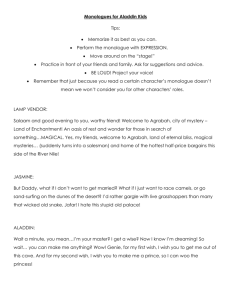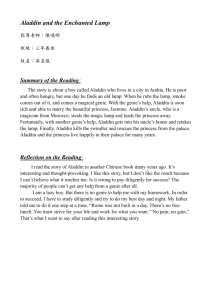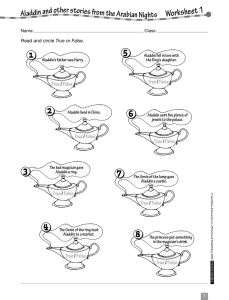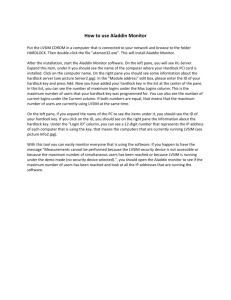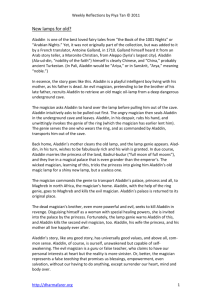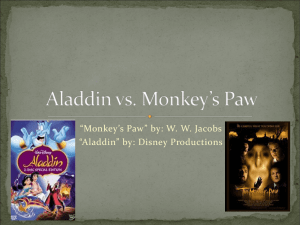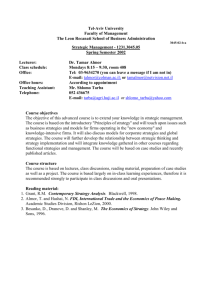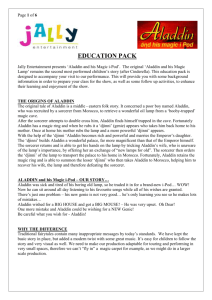Instructors Guide for Aladdin
advertisement
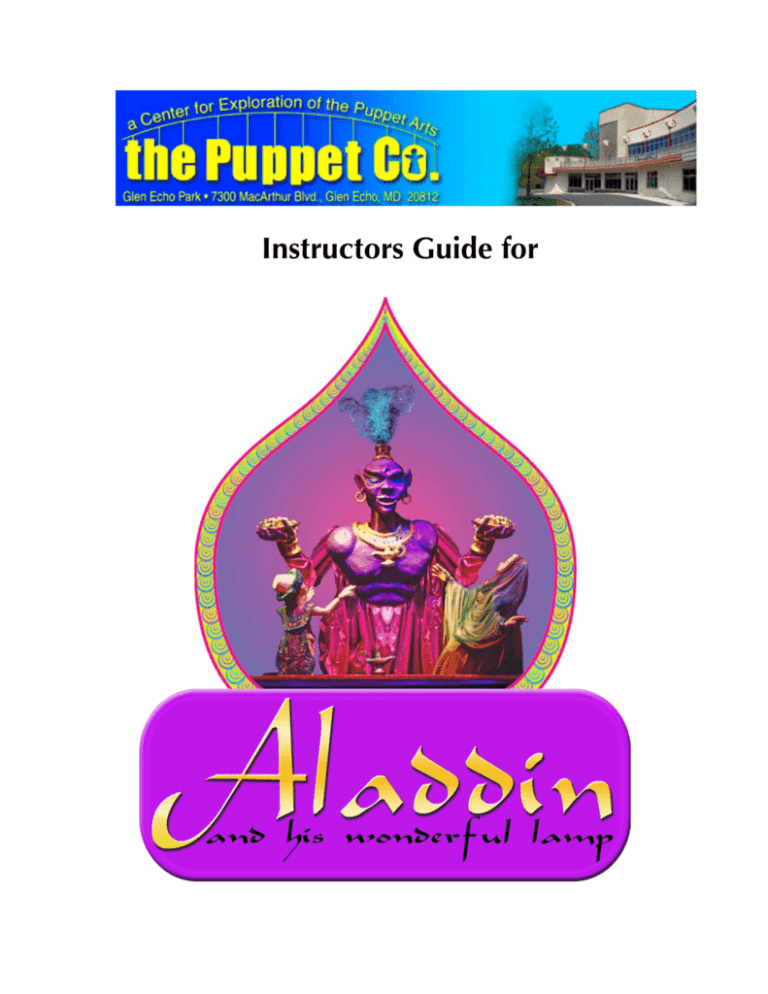
Instructors Guide for About the Puppets The puppets used in Aladdin are rod puppets. These figures are manipulated from below the stage. They are full-length, supported by a rod running inside the body to the head. Separate thin rods may move the hands and, if necessary, the legs. Here are several examples of rod puppets. American puppeteer Marjorie Batchelder McPharlin made these figures in the 1930s . About the Story Aladdin is a story from One Thousand and One Nights, which is a collection of West and South Asian stories and folk tales. It is often known in English as The Arabian Nights, from the first English language edition (1706), which was entitled The Arabian Nights' Entertainment. The stories were collected over many centuries by various authors, translators, and scholars across West, Central, South Asia and North Africa. The tales themselves trace their roots back to ancient and medieval Arabic, Persian, Indian, Egyptian and Mesopotamian folklore and literature. This is the cover of one of the many versions of The Arabian Nights that have been available over the years. The Story Aladdin, a poor boy living in ancient Baghdad, is recruited by an evil Magician who has disguised himself as the brother of Aladdin's late father, Mustapha the tailor. The Magician convinces Aladdin and his mother of his good will by pretending to make arrangements to set up the lad as a wealthy merchant. The Magician's real motive is to persuade young Aladdin to retrieve a magic oil lamp from a mysterious cave. Aladdin finds himself trapped in the cave. Fortunately, he has a magic ring lent to him by the Magician as protection. When he rubs the ring, a genie appears who takes him home to his mother. Aladdin still has the lamp from the magic cave. When his mother tries to clean it up to sell it, a second far more powerful genie appears who is bound to do the bidding of the person holding the lamp. With the aid of the genie of the lamp, Aladdin becomes wealthy and powerful and marries Princess Badre-al-Budor, the Sultan's daughter. The genie also builds Aladdin a wonderful palace. The Magician returns and is able to regain the lamp by tricking Aladdin's wife (who is unaware of the lamp's importance) by offering to exchange "new lamps for old". He orders the genie of the lamp to take the palace along with all its contents to his home in Egypt. Fortunately, Aladdin still has the magic ring and is able to summon the lesser genie. Although the genie of the ring cannot directly undo any of the magic of the genie of the lamp, he is able to transport Aladdin to the deserts of Northern Africa where he recovers the lamp, destroys the Magician, and returns the palace (complete with the princess) to its proper place. Before the Show Read the story of Aladdin as it appears in this guide. The Puppet Co. production follows the original version of Aladdin as it appears in the translation by Sir Richard Burton. You, your children, or students, may be more familiar with versions of the story, in particular the Disney version, which may be less faithful to the original. For instance, the fact that there are two genies in the story will be surprising to many. The names of the characters may also be surprising. We use the names as they appear in The Arabian Nights, and we pronounce them as they may have sounded in ancient times. After the Show The story of Aladdin is filled with magic, spirits, and genies both great and small. Here’s are a few questions regarding the use of magic in this story: 1. The Magician is able to summon the spirits, but is he controlling the spirits, or are the spirits controlling him? Can you think of examples? 2. Aladdin grows from being a rambunctious boy to being a strong, responsible man in the story. Do the spirits and genies help and guide him, or lead him astray? 3. One of the genies does Aladdin’s bidding - the other actually controls him. Which is which? Theater Etiquette A visit to the Puppet Co. Playhouse may be the very first trip to any theatrical performance for some of your students. We want this to be a happy experience for everyone. Before you enter the theater, our House Manager, the person who is responsible for your safety and comfort during the performance, will welcome you, and will inform you about the seating of you group. At some of the performances, one of the performers will come out to introduce the show and remind everyone about theater “manners” using this easy to remember poem: Please don’t eat, and stay down in you seat. Don’t walk about, and don’t talk or shout. Don’t take pictures or touch the display fixtures, And, if the babies bawl, take them down the hall! Have a great visit to the Puppet Co. Playhouse!
